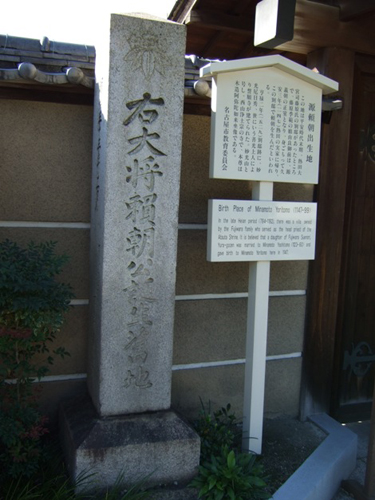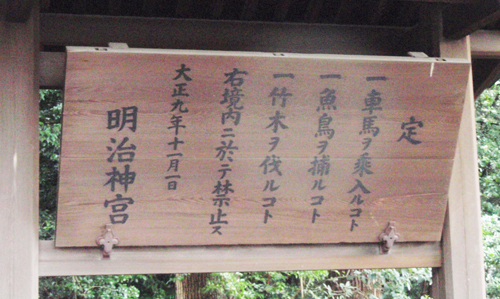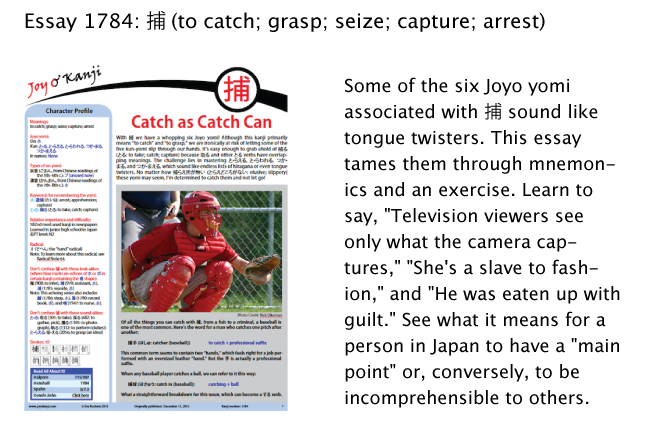Knowing Your Lefts from Your Rights
Do you know your lefts from your rights? Let's see by means of a quiz!
1. In the photo below, the text on the stone marker is as follows:
右大将頼朝公誕生舊地
Historic Site of Right General Lord Yoritomo’s Birth
右大将 (うだいしょう: right general); 頼朝 (よりとも: given name of a revered historic figure who lived from 1147 to 1199 and established the Kamakura shogunate in 1192); 公 (こう: lord); 誕生 (たんじょう: birth); 舊地 (きゅうち: historic site, where 舊 is non-Joyo)
A "right general" was kind of like a right-hand man; the term referred to the man near the emperor’s right hand. Meanwhile, the “left general” (左大将, さだいしょう) occupied the space to the left of the emperor and ranked higher than the man on the right. Why did he rank higher?
a. Although the West associates "right" with "being correct" and "left" with negative things such as unluckiness and the word "sinister," the East sees this issue the opposite way.
b. The emperor’s throne faced south, which meant that his left side was to the east. Because the sun rises in the east, the left side was more important.
c. A right-handed emperor could easily reach anything to his right, rendering the right general practically superfluous. The left general was much more valuable to him.
2. When 右 (みぎ: right) appears in formal, vertical Japanese writing, it can serve double duty. What else can it convey besides "right"?
a. aforementioned
b. legal rights
c. moral righteousness
d. normal; typical

Photo Credit: 投稿者
1.b. The emperor’s throne faced south, which meant that his left side was to the east. Because the sun rises in the east, the left side was more important! That’s fitting for the Land of the Rising Sun. Also, a sunrise confers hope for a bright future, whereas the Japanese associate sunsets with things in decline.
There's more about the stone marker in essay 1889 on 頼 (reliance; request; trust), which came out last week.
By the way, answer a (Although the West associates "right" with "being correct" and "left" with negative things such as unluckiness and the word "sinister," the East sees this issue the opposite way) was completely untrue. That is, according to a Wikipedia page on "handedness," southpaws in China are strongly encouraged to use their right hands when writing. That source says, "Due to the importance of stroke order, developed for the comfortable use of right-handed people, it is considered more difficult to write legible Chinese characters with the left hand...." I can see that that would be true for individual characters, but wouldn't a leftie have an advantage when writing vertically and filling the page from right to left? Moving across the page in that direction, you wouldn't smear ink if you were using your left hand.
You may be wondering about the term "right-hand man." That originated in the military in the Western world circa 1800.
One more thing—could there be any connection between the term "southpaw" and the emperor's throne? No, of course not! Originally, Americans used "southpaw" for left-handed baseball players. One theory has it that this was because baseball pitchers traditionally face west, so a left-handed pitcher would throw with the hand to the south side of his body. Really? They face west? I didn't know that! I guess that's so they can enjoy great sunsets!
2.a. When 右 (みぎ: right) appears in formal, vertical Japanese writing, it can mean "aforementioned." That is, the 右 refers to the text that one has already read, which is to the the right. There's an example of such a sign in essay 1784 on 捕 (to catch; grasp; seize; capture; arrest), which came out today. Here's the sign:

Photo Credit: Eve Kushner
A sign at Meiji Shrine in Tokyo.
Shifting gears, I'd like to share a few more tidbits I gleaned while writing that essay.
This word has a wide variety of meanings:
捕らわれる (とらわれる: (1) to be caught; be captured; be taken prisoner; be arrested; be apprehended; (2) be seized with (fear, etc.); be a slave to; stick to; adhere to; be swayed by)
The Japanese use this common term for prisoners and captives, which is no surprise. Figuratively, they also apply it to anyone who is caught up in or tied to some way of thinking:
彼らはまだ伝統に捕らわれている。
They are still bound by tradition.
彼ら (かれら: they); 伝統 (でんとう: tradition)
田中は目先の利益に捕らわれすぎる。
Tanaka is swayed too much by the thought of immediate gains.
田中 (たなか: surname); 目先 (めさき: immediate; before one's eyes); 利益 (りえき: gains)
彼女は偏見に捕らわれない。
She is liberal in her thinking.
彼女 (かのじょ: she); 偏見 (へんけん: prejudice, narrow view)
Because it's natural to judge anyone who can't think freely and who is instead a slave to certain ways of thinking, 捕らわれる often has a negative nuance. I therefore puzzled over the last sample sentence before noticing that the verb is negative. The woman is not trapped in prejudiced or narrow-minded ways of thinking. Thus, she is liberal.
By the way, the second sentence offers us a great word:
目先 (めさき: immediate; before one's eyes) eyes + before
I can just see yen signs floating before Tanaka's eyes!
Here's one more tidbit from essay 1784:
輪を描いて飛ぶワシは猿を捕食する。
The circling eagles are preying upon on the monkeys.
輪 (わ: circle); 描く (えがく: to draw); 飛ぶ (とぶ: to fly); ワシ (eagle); 猿 (さる: monkey); 捕食 (ほしょく: preying upon)
Hey, this sentence starts with 輪, which can also mean "ring." This was just elected kanji of the year because of Japan's successful bid to host the Olympics in 2020!
When I asked my proofreader what role 描いて plays in the sentence, he said that the eagles are flying in circles, looking as if they’re drawing circles in the sky! I'm so happy to hear that eagles can draw! It seems that just about everyone in Japan is artistic!
Oh, and the Japanese word for "eagle" is ワシ (written in kanji with the non-Joyo 鷲). That sounds just like 和紙 (わし), the beautiful paper that the Japanese have traditionally made. Art abounds!
Here's a sneak preview of the new essay 1784 on 捕:

Have a great weekend!

Comments